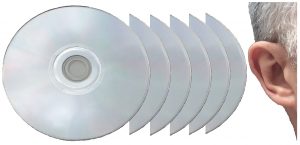What’s the deal with audiobooks? The market for them seems to be rising, with improvements in delivery technology, reductions in price, and increases in reader’s demands to enjoy books while multitasking. Today’s question: are audiobooks a good thing for authors, like you?
From the Reader’s Perspective
There’s something different about listening to a story, isn’t there? Something olden, even ancient. People told stories verbally for millennia before developing writing. When Edison invented the phonograph, he thought its primary use would be for books, not music. President Franklin Roosevelt understood the power of the spoken voice as he radioed his fireside chats.
 Printed words are sterile by comparison. They sit there on the screen or page until your mind gives them substance. But the narrator of an audiobook breathes life, drama, tension, humor, horror, etc. into those same words. A good narrator gives the characters different and distinct voices that help conjure a picture of each one.
Printed words are sterile by comparison. They sit there on the screen or page until your mind gives them substance. But the narrator of an audiobook breathes life, drama, tension, humor, horror, etc. into those same words. A good narrator gives the characters different and distinct voices that help conjure a picture of each one.
In addition to the difference in the audio reading experience, readers can multitask while listening, in ways they can’t do with print books. They can read while driving, showering, cooking, exercising, gardening, or performing similar tasks.
From the Author’s Perspective
We can see why readers might like audiobooks, but what’s in it for authors? Creating an audiobook is a more labor-intensive process than creating ebooks or print books, making it both slower and more expensive.
The process goes like this. You submit your novel to an audiobook publisher. If they accept, you wait for interested narrators to send you audition tapes. If you don’t like any of them, you start over and resubmit your manuscript again. Once you choose a narrator and arrange payment (see Costs below), send the narrator a pronunciation guide to your story including character names and descriptions of character voices. Listen to the chapters as the narrator sends you each recorded tape in turn. If there are mistakes, send have the narrator that chapter. (Perhaps you forgot to send that pronunciation guide.)
Note: it will likely sound strange to have your words read to you by someone else. The narrator will emphasize different parts of your sentences, give characters different sounding voices than you imagined, etc. You’ll need to get past that.
Costs
Did I mention audiobooks are expensive? First, you pay the audiobook publisher. Then you pay the narrator. The best narrators can demand payment up front. A narrator may instead offer you a 50-50 split of the remaining royalties (after the publishing company’s slice). Some narrators charge an hourly fee, calculated based on finished recording hours; you’ll only pay of the duration of the completed recording, not for the narrator’s mistakes.
Audiobook Industry Outlook
At present, there’s strong competition among audiobook publishers, and many from which you can choose, including Audible, Inc.; Beacon Audiobooks; Blackstone Audio; Caedmon Audio; Deyan Audio; and Recorded Books. You can also record your own book very inexpensively at home. Some books are being produced solely in audiobook form, without a print version being published.
There are numerous devices for listening to audiobooks now, including cell phones; desktop and laptop computers; compact disk players; MP3 players; and intelligent personal assistants such as the Amazon Echo, Cortana, Siri, and Google Home.
With retirement of the baby boomer generation, many expect the audiobook market to continue to grow.
Should you have your novel, or short story collection, published as an audiobook? Perhaps you can now make that decision yourself, thanks to the information provided by—
Poseidon’s Scribe
